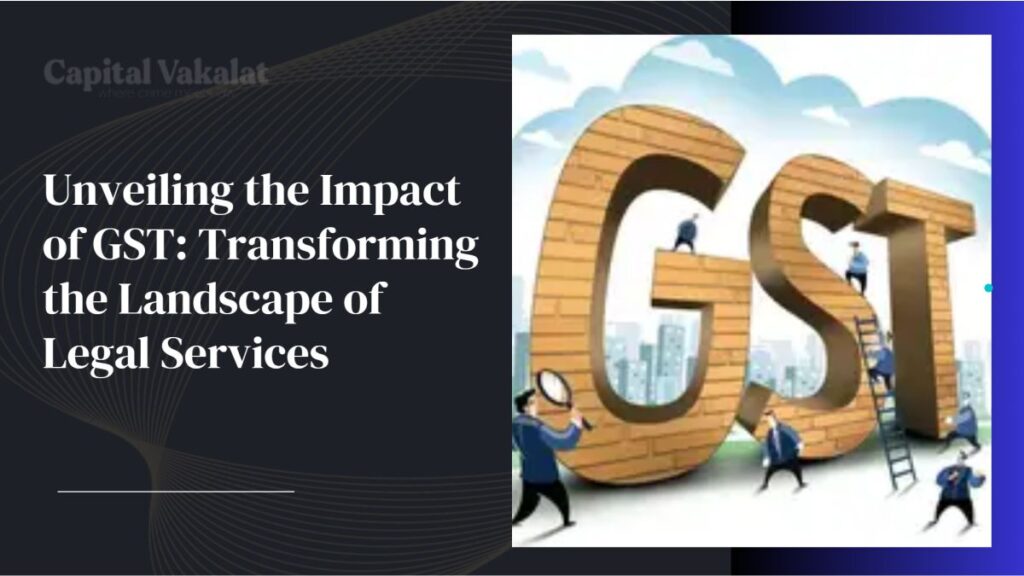In the labyrinth of India’s taxation system, the introduction of Goods and Services Tax (GST) marked a transformative juncture. This comprehensive tax overhaul aimed to streamline the tax structure and unify the erstwhile complex web of indirect taxes.

However, within this intricate framework, a pertinent question arises: How does GST impact legal services in India?
GST and Legal Services: The Nexus
As the legal domain encompasses a spectrum of services, it’s imperative to delineate the correlation between GST and these services. Legal services span a wide spectrum, encompassing consultation, litigation, and advisory services. The application of GST to these services hinges on multiple factors, leading us to explore the nuances in detail.
Types of Legal Services
Before we delve deeper, let’s demystify the different shades of legal services. Consultation involves legal advice, opinion, and analysis, while litigation pertains to representing clients in courts. Advisory services encompass a broader advisory role, including contract drafting and negotiation. Understanding these distinctions lays the foundation for comprehending GST implications.
Levy of GST on Legal Services
The imposition of GST on legal services is not a blanket rule. Certain aspects fall within the ambit of GST, while others may enjoy exemptions. Deciphering the boundary between these two realms is crucial. Services provided by individual lawyers and law firms, including sole practitioners, are often subject to GST, while certain core legal activities remain exempt.
Reverse Charge Mechanism
An intriguing facet of GST on legal services is the Reverse Charge Mechanism (RCM). Typically, the service provider is responsible for GST payment. However, under RCM, the onus shifts to the recipient. This mechanism has implications not only for the financial aspect but also for compliance and documentation.
Input Tax Credit in Legal Services
To untangle the intricacies further, let’s explore Input Tax Credit (ITC). Legal practitioners, like other businesses, can avail themselves of ITC. This credit mechanism allows them to set off taxes paid on input services against their output tax liability. Navigating this labyrinth of credits necessitates a clear understanding of eligible inputs and prescribed conditions.
Impact on Legal Practitioners
The seismic shift of GST’s implementation ripples through the legal profession. Legal practitioners, be they advocates, solicitors, or attorneys, find themselves at the crossroads of complying with GST regulations while delivering seamless services. This impact reverberates through their practice, from fee structuring to record-keeping.
GST’s Influence on Clients
As the ripples of GST spread, clients seeking legal services inevitably feel the effect. The financial implications of GST, coupled with the evolving cost structure, necessitate a discerning approach. Clients must fathom the interplay between GST and legal fees to make informed decisions.
Challenges and Concerns
With every revolutionary change comes a slew of challenges. The implementation of GST on legal services is no exception. Ambiguities and complexities loom, from classification issues to determining the place of supply. Navigating these challenges requires a concerted effort from both legal practitioners and authorities.
Compliance and Record-Keeping
Compliance forms the bedrock of the GST regime. Legal practitioners must meticulously adhere to various compliance requirements, from timely filing of returns to accurate record-keeping. The digital infrastructure plays a pivotal role in ensuring seamless compliance, underscoring the need for technological integration.
Recent Developments and Case Studies
The canvas of GST on legal services is continually evolving. Real-life scenarios shed light on the practical implications. Examining case studies and recent developments provides insights into the functioning of GST in the legal sphere.
Strategies for GST Optimization
Amid challenges lies the opportunity for optimization. Legal practitioners and law firms can strategize to maximize GST benefits while ensuring strict adherence to compliance norms. By leveraging technology, understanding exemptions, and adopting best practices, GST optimization becomes a tangible goal.
Future Outlook
The trajectory of GST on legal services is a subject of curiosity and speculation. As the legal and taxation landscapes evolve, anticipations of changes and amendments abound. A proactive approach to staying abreast of these developments is essential for legal practitioners and clients alike.
Conclusion
In this whirlwind tour of GST on legal services in India, we’ve unearthed the intricacies that intertwine taxation and the legal domain. The metamorphosis brought about by GST resonates through every facet of legal practice, from practitioners’ day-to-day operations to clients’ decision-making processes.
In this ever-evolving landscape, the interplay between legal services and GST is both intriguing and essential. As the corridors of legislation and taxation intersect, staying informed and adaptable remains the hallmark of success for legal professionals and clients navigating the maze of GST
FAQs
What is the Reverse Charge Mechanism in GST for legal services?
Under the Reverse Charge Mechanism, the recipient of the service becomes responsible for paying GST instead of the service provider.
Can legal practitioners claim Input Tax Credit (ITC) for taxes paid on inputs?
Yes, legal practitioners can claim ITC for taxes paid on eligible input services, subject to fulfilling certain conditions.
How does GST impact the cost of legal services for clients?
GST can influence the cost structure of legal services, potentially affecting clients’ financial decisions when seeking legal assistance.
How can legal practitioners optimize GST benefits while ensuring compliance?
Legal practitioners can optimize GST benefits by leveraging technology, understanding exemptions, and adopting best practices for compliance.